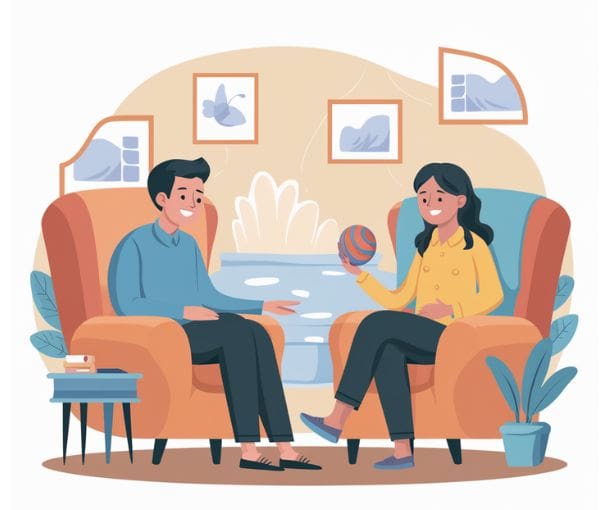Anxiety Therapy in Columbus

Anxiety therapy is a type of treatment designed to help people manage and reduce their feelings of anxiety. Anxiety is a normal response to stress or danger, but when it becomes overwhelming or lasts for a long time, it can interfere with daily life. Anxiety therapy in Columbus aims to provide tools and strategies to help individuals cope with anxiety and improve their overall well-being.
Thera-fi refers to various methods used to treat anxiety disorders in the Columbus area. These methods can include talking to a therapist (cognitive-behavioral therapy), taking medication, or using relaxation techniques like meditation and deep breathing. The goal of anxiety therapy is to help individuals understand their anxiety, learn how to manage it, and reduce its impact on their lives.

Importance of Seeking Anxiety Therapy
Seeking anxiety therapy is important because untreated anxiety can lead to serious problems. Chronic anxiety can affect physical health, leading to issues like high blood pressure, heart disease, and weakened immune function. It can also impact mental health, causing depression, panic attacks, and a lower quality of life. Anxiety therapy in Columbus provides a safe space to explore anxiety triggers and develop effective coping mechanisms.
Research shows that therapy, especially cognitive-behavioral therapy (CBT), is effective in reducing anxiety symptoms. CBT helps by changing negative thought patterns and behaviors that contribute to anxiety. Studies also indicate that combining therapy with medication can be particularly effective for some people.
Overview of Anxiety Therapy
In Columbus, there are many options for anxiety therapy. These services can be found in private practices, hospitals, and community mental health centers. Therapists in Columbus use a variety of techniques tailored to individual needs, including:
- Cognitive-behavioral therapy (CBT): This is one of the most common and effective forms of therapy for anxiety. It focuses on changing negative thought patterns and behaviors.
- Exposure Therapy: This helps individuals gradually face and overcome their fears in a controlled and safe environment.
- Medication: Psychiatrists in Columbus can prescribe medications that help manage anxiety symptoms, such as antidepressants or anti-anxiety drugs.
- Group Therapy: This allows individuals to share their experiences and learn from others facing similar challenges.
- Mindfulness and Relaxation Techniques: Techniques such as meditation, deep breathing exercises, and yoga can help reduce stress and anxiety.
According to the American Psychological Association, CBT is highly effective for treating anxiety disorders. Studies have shown that about 60-80% of people with anxiety who complete CBT experience significant improvement. Additionally, integrating mindfulness-based stress reduction techniques has been shown to decrease anxiety and improve overall mental health.

Types of Anxiety Therapy
There are several types of anxiety therapy available, each with its unique approach to helping individuals manage and reduce their anxiety. Here’s a look at some common types and how they work, explained in simple, scientific language.
1. Cognitive-Behavioral Therapy (CBT)
How it works:
- Cognitive-behavioral therapy (CBT) is based on the idea that our thoughts, feelings, and behaviors are interconnected. When someone experiences anxiety, their thoughts can become negative and distorted, which in turn affects their feelings and behaviors.
- Research shows that CBT is highly effective for treating anxiety. It works by rewiring the brain’s response to stress through repeated practice of positive thinking and behavior changes.
Example: If you think, “I will fail this test,” you might feel extremely anxious and avoid studying altogether. CBT helps by teaching you to recognize and challenge these negative thoughts. Instead, you might learn to think, “I can prepare for this test and do my best,” which can reduce anxiety and lead to more productive behaviors like studying.


2. Exposure Therapy
How it works:
- Exposure Therapy involves gradually facing the things that cause anxiety in a controlled and safe manner. The idea is that by repeatedly exposing yourself to your fears, you become less sensitive to them over time.
- Studies have shown that Exposure Therapy can be very effective in reducing specific phobias and anxiety disorders. By confronting fears in a safe environment, the brain learns that the feared situation is not as dangerous as initially thought.
Example: If you have a fear of public speaking, Exposure Therapy might start with imagining giving a speech, then progress to speaking in front of a small, supportive group, and eventually to larger audiences. This gradual exposure helps reduce the fear response.
3. Medication
How it works:
- Medications for anxiety, such as antidepressants and anti-anxiety drugs, work by altering the brain’s chemistry to help regulate mood and stress levels. They can help reduce symptoms of anxiety, making it easier to engage in therapy and daily activities.
- Numerous studies have demonstrated that medications can effectively reduce anxiety symptoms, especially when combined with therapy. They help stabilize the chemical imbalances in the brain that contribute to anxiety.
Example: A common medication for anxiety is an SSRI (Selective Serotonin Reuptake Inhibitor), which increases the levels of serotonin in the brain. Serotonin is a neurotransmitter that helps regulate mood, and higher levels can help improve mood and reduce anxiety.


4. Mindfulness and Relaxation Techniques
How it works:
- Mindfulness and relaxation techniques, such as meditation, deep breathing exercises, and yoga, help reduce stress and anxiety by promoting a state of relaxation and awareness of the present moment.
- Research has shown that these techniques can significantly reduce anxiety levels. They work by activating the body’s relaxation response, which counteracts the stress response and helps restore a sense of calm.
Example: Practicing deep breathing exercises can help calm the nervous system and reduce the physical symptoms of anxiety, such as a racing heart or shallow breathing. Mindfulness meditation enables you to focus on the present moment, reducing worries about the past or future.
5. Group Therapy
How it works:
- Group Therapy involves meeting with a therapist and a group of people who are experiencing similar issues. It provides a supportive environment to share experiences, learn from others, and practice new skills.
- Studies indicate that group therapy can be very effective for treating anxiety. It provides a sense of community and support, which can be incredibly beneficial for individuals feeling isolated by their anxiety.
Example: In a group therapy session for social anxiety, participants might practice social interactions with each other in a safe setting. This can help build confidence and reduce anxiety in real-world social situations.

In Columbus, you can find all these types of therapy at various mental health clinics, private practices, and hospitals. Whether you prefer one-on-one sessions or group therapy, there are many options available to help you manage and reduce your anxiety effectively. Discover how therapy helps with anxiety by offering tools for emotional regulation and stress management.
Benefits of Anxiety Therapy
Anxiety therapy offers numerous benefits, helping individuals manage and reduce their anxiety through various techniques and approaches. These benefits can be categorized into short-term and long-term advantages.

Short-term Benefits
Immediate Relief Techniques
- Calming the Mind and Body: Techniques such as deep breathing exercises, progressive muscle relaxation, and mindfulness meditation can provide immediate relief from anxiety symptoms. These methods help calm the nervous system and reduce physical symptoms like rapid heartbeat and shallow breathing.
- Breaking the Cycle of Negative Thoughts: Cognitive-behavioral therapy (CBT) offers strategies to identify and challenge negative thought patterns. This can provide quick relief by changing the way you think about anxiety-provoking situations.
Long-term Benefits
Building Resilience
- Developing Coping Strategies: Therapy teaches long-term coping strategies that help manage anxiety in various situations. These strategies become tools you can use whenever anxiety arises, building resilience over time.
- Improving Self-Awareness: Therapy helps you become more aware of your thoughts, feelings, and behaviors. This self-awareness is crucial for understanding what triggers your anxiety and how to manage it better.
Preventing Relapse
- Creating a Support System: Therapy often involves building a support network, whether through group therapy or involving family and friends. This network provides ongoing support, making it easier to maintain progress and prevent relapse.
- Establishing Healthy Habits: Long-term therapy focuses on developing healthy lifestyle habits that support mental health, such as regular exercise, a balanced diet, and adequate sleep. These habits can help prevent anxiety from returning.
In Columbus, various mental health services offer these benefits through different types of anxiety therapy. Whether seeking immediate relief techniques or long-term strategies to build resilience and prevent relapse, individuals can find the support they need to manage their anxiety effectively. Learn about the difference between CBT and CPT therapy and how each can address anxiety and trauma.
Why Choosing us
Thera-Fi specializes in Anxiety Therapy in Columbus, offering tailored treatment plans designed to address various levels of anxiety. Our therapists are highly trained in the latest evidence-based techniques.
- Experienced Therapists: Our team consists of licensed and experienced therapists who are experts in anxiety treatment. They bring a wealth of knowledge and a compassionate approach to every session.
- Personalized Treatment Plans: At Thera-Fi, we understand that each client is unique. We create customized therapy plans that cater to individual needs, ensuring the most effective treatment.
- Flexible Scheduling: We offer flexible appointment times, including evenings and weekends, to accommodate busy schedules. Online therapy options are also available for those who prefer remote sessions.
- Progress Tracking: Thera-Fi emphasizes measurable outcomes. We use various tools and techniques to track progress, ensuring that clients see tangible improvements in their anxiety management.
- Supportive Environment: Our therapists are committed to creating a safe and non-judgmental space where clients can openly discuss their concerns and work towards their goals.
- Collaborative Care: If needed, we collaborate with other healthcare professionals to provide comprehensive care, including medication management and holistic approaches.

What to Expect in Therapy
Initial Consultation
- The initial consultation in therapy is a crucial first step. It typically involves an introductory meeting where the therapist and client get to know each other. During this session, the therapist will gather information about the client’s background, current issues, and therapy goals. This meeting sets the foundation for the therapeutic relationship and helps the therapist understand how to best assist the client.
- At Thera-Fi, we ensure that our initial consultations are comfortable and informative, providing a safe space for clients to share their concerns. Our specialized approach to Anxiety Therapy in Columbus is designed to make this first step as smooth as possible.
What Happens During the First Session
- The first therapy session is often an extension of the initial consultation. The therapist might delve deeper into the client’s history, exploring past experiences, current life circumstances, and specific issues they wish to address. This session also involves discussing confidentiality, therapy structure, and setting initial goals.
Typical Therapy Sessions
- Typical therapy sessions at Thera-Fi are designed to provide a consistent and supportive space for clients. These sessions usually last about 45 minutes and occur weekly or bi-weekly, depending on the client’s needs and progress. During these sessions, therapists use evidence-based techniques to help clients explore their thoughts, feelings, and behaviors.
- For those seeking Anxiety Therapy in Columbus, our sessions focus on identifying anxiety triggers, developing coping strategies, and working toward long-term mental health goals.
Structure and Duration
- The structure and duration of therapy vary based on individual needs. However, a standard course of therapy might last from a few months to a year. Each session follows a structured format, beginning with a check-in on recent experiences and progressing to deeper exploration and skill-building.
Setting Goals and Tracking Progress
- Setting goals is a fundamental part of the therapy process. During the initial sessions, the therapist and client will work together to establish clear, achievable goals. These goals provide direction and focus for therapy. Tracking progress is equally important, as it helps both the therapist and client see improvements and adjust the treatment plan as necessary.
Thera-Fi’s approach to Anxiety Therapy in Columbus emphasizes measurable outcomes. We use various tools and techniques to track progress, ensuring that clients see tangible results from their therapy sessions.
Common Misconceptions About Anxiety Therapy
Therapy is Only for Severe Problems
- Misconception: Therapy is only necessary for severe mental health issues.
- Facts: Research shows that therapy can be beneficial for a wide range of anxiety levels, from mild to severe. Cognitive Behavioral Therapy (CBT), for instance, is effective in treating mild anxiety by helping individuals develop coping strategies before their anxiety becomes severe. Our Anxiety Therapy in Columbus is designed to support individuals at all levels of anxiety, providing tailored approaches to meet each client’s unique needs.
Therapy Takes Too Long to Work
- Misconception: Therapy requires years before seeing any results.
- Facts: Studies indicate that many clients experience significant improvement within 8 to 12 sessions of CBT, particularly for anxiety disorders . The structured nature of therapy allows for early wins that can motivate clients to continue. We focus on providing efficient and effective Anxiety Therapy in Columbus, with a structured approach that tracks progress to ensure timely results.
Talking About Problems Makes Them Worse
- Misconception: Discussing problems will intensify them.
- Facts: Talking about issues can lead to cognitive reappraisal, a process where individuals reframe their thoughts to reduce emotional impact. Neuroimaging studies show that discussing and reinterpreting distressing events can decrease activity in the amygdala, the brain’s fear center, and increase activity in the prefrontal cortex, associated with rational thinking. Our therapists create a safe space for clients to explore their feelings, helping them to understand and manage their anxiety better.
Therapists Just Listen and Don’t Offer Solutions
- Misconception: Therapists only listen without providing practical advice.
- Facts: Therapists use evidence-based interventions like CBT, which involves active collaboration between therapist and client to develop practical skills. Techniques such as exposure therapy, cognitive restructuring, and mindfulness are common in anxiety treatment and have been empirically validated to reduce symptoms. Our Anxiety Therapy in Columbus includes actionable insights and practical tools to help clients overcome their anxiety.
You Need to Be on Medication
- Misconception: Therapy is ineffective without medication.
- Facts: Psychological therapies, especially CBT, are effective as standalone treatments for many individuals with anxiety disorders. Meta-analyses show that CBT can be as effective as medication, with the added benefit of fewer side effects and lower relapse rates. However, for some, a combination of therapy and medication is optimal. We offer comprehensive Anxiety Therapy in Columbus that focuses on therapeutic techniques. We can also collaborate with medical professionals if medication is deemed necessary.
Therapy is a Sign of Weakness
- Misconception: Seeking therapy is a sign of personal weakness.
- Facts: Seeking therapy is an act of self-care and resilience. Psychological research highlights that recognizing the need for help and taking proactive steps to address mental health challenges is indicative of emotional strength and resourcefulness. We empower our clients by providing supportive and effective Anxiety Therapy in Columbus, reinforcing that seeking help is a positive and courageous decision.
By addressing these misconceptions with scientific evidence, Thera-Fi aims to provide clear, supportive, and effective Anxiety Therapy in Columbus, helping clients feel confident and informed about their mental health journey.
Thera-Fi: Your Path to Overcoming Anxiety
Choosing the right therapist is essential for effective therapy. It involves looking at their qualifications, experience, and approach to therapy, as well as their availability and whether you feel comfortable with them. At Thera-Fi, we make this choice easier by offering highly qualified and experienced therapists who specialize in anxiety therapy. Our team uses proven, evidence-based techniques like DBT therapy, CBT therapy, and Trauma Therapy to help you manage and overcome anxiety.
Thera-Fi stands out by providing personalized treatment plans tailored to your specific needs. We offer flexible scheduling, including online sessions, to fit into your busy life. Our services go beyond just anxiety therapy; we also offer help for depression, trauma, relationship issues, and more. With a focus on measurable progress and a supportive, non-judgmental environment, Thera-Fi is dedicated to helping you achieve your mental health goals.
Visit Thera-Fi to learn more about our comprehensive services, including individual therapy, couples therapy, and specialized treatments for various mental health concerns. Whether you’re dealing with anxiety or other issues, Thera-Fi is here to support you on your journey to better mental health.
Frequently Asked Questions
What types of anxiety therapy are available in Columbus?
In Columbus, a variety of anxiety therapies are available, including Cognitive Behavioral Therapy (CBT), which helps modify negative thoughts and behaviors; Exposure Therapy, which gradually introduces anxiety triggers in a controlled environment; and Acceptance and Commitment Therapy (ACT), which encourages patients to accept their feelings as a step toward personal growth.
What should I expect during my first anxiety therapy session?
During your first session, the therapist will likely discuss your medical and mental health history, your current symptoms, and your therapy goals. This initial consultation is also an opportunity for you to assess how comfortable you feel with the therapist.
How long does anxiety therapy typically last?
The duration of anxiety therapy can vary depending on the individual’s specific needs, the severity of symptoms, and the type of therapy being used. Some people might see improvements within a few weeks, while others may require longer-term therapy.
What are the signs that I should consider seeking anxiety therapy?
Signs that you might benefit from seeking anxiety therapy include persistent worry or fear that interferes with daily activities, physical symptoms like rapid heartbeat or sweating, avoidance of certain situations due to anxiety, and a noticeable decline in performance at work or school.
How do I find a qualified anxiety therapist in Columbus?
You can find qualified anxiety therapists in Columbus by checking with local mental health associations, asking for referrals from your primary care physician, or searching online directories like Psychology Today, which provide profiles of therapists including their qualifications, specialties, and patient reviews.
